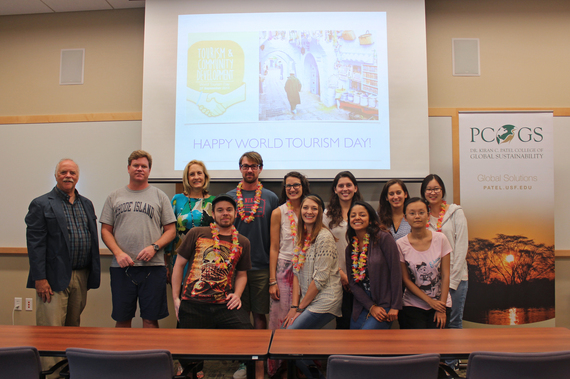Our sustainable tourism class this week celebrated World Tourism Day with listening to World Tourism day messages, and a good discussion on the Global Code of Ethics for Tourism.
Following the reading of the message from U.N. Secretary General Ban Ki-moon, and the video message from Taleb Rifial, Secretary General of the U.N. World Tourism Organization (UNWTO).
We then enjoyed some fair trade coffee and special tourism cake as we discussed the principles of the Global Code of Ethics for Tourism and its relationship to community development and the Global Sustainable Tourism Council.
The discussion resulted in three important conclusions by the class.
- The Global Code of Ethics for Tourism is necessary for good and responsible community development to take place in the tourism industry.
The Global Code of Ethics for Tourism provides an important framework of ethical principles to guide tourism development and operations.
Some of the highlights in the ten articles include:
- The important contribution tourism makes in increasing understanding, tolerance, and respect for diversity in the world.
- The opportunity in tourism for individual or collective fulfillment through a number of travel purposes including but not limited to, religion, health, education, cultural or linguistic exchanges, and the opportunity to further the concept of human rights.
- Tourism is called upon to both be an example and to provide the road map for sustainable development in the larger communities in which they do business.
- Tourism is called upon to enhance cultural heritages of a community.
- Tourism is called upon to provide a number of financial benefits and raise the standard of living for the community.
- Ethical tourism has obligations to provide honest and accurate information to tourists, and to work with public authorities to insure safety and security as well as the freedom for tourists to practice their own religion or spiritual practice.
- Tourism is called upon to help guarantee the fundamental rights of workers and to ensure that they have opportunities for ongoing training, access to the work force, and to participate in exchanges around the world. In addition tourism is called to provide protection as outlined in the Universal Declaration of Human Rights, to provide opportunities for leisure opportunities in cooperation with public authorities, and provide tourism opportunities for diverse groups such as family, youth, students, seniors, and people with disabilities.
- Tourism is called to promote the principle of liberty that allows for free travel both within states and between states and protection of confidentiality when traveling.
- Tourism is called upon to provide for the rights of workers and entrepreneurs including fair and adequate compensation, opportunities for ongoing training, social protection, and minimization of job insecurity.
- Tourism is called upon to from new public and private cooperation in the implementation of the Global Code of Ethics for Tourism and to recognize the role of international institutions such as the UN World Tourism Organization (UNTWO) and non-governmental organizations (NGO) with competence in the field of tourism.
The Global Sustainable Tourism Council (GSTC) is one such NGO with the UNWTO having expertise in the field of tourism and with both the UNTWO & UNEP having permanent seats on the GSTC board.
The GSTC has defined minimum criteria for sustainable tourism and developed a process to recognize other certification programs that meet the minimum GSTC criteria.
The GSTC Criteria are the result of a worldwide effort to develop a common language about sustainability in tourism. Focusing on social and environmental responsibility, as well as the positive and negative economic and cultural impacts of tourism, the criteria are organized into four topics.
- Sustainable management
Third party certification is needed for sustainable tourism and the process is a valuable tool for community development. Without a third party certification process the Global Code of Ethics for Tourism risks remaining little more than great principles that are not implemented.
The GSTC criteria provides a framework for responsible community development including criteria contained in the Global Code of Ethics including but not limited to the following requirements:
- Management addresses environmental, social, cultural, economic, quality, health and safety issues
- Providing accurate and honest information
- Respect the natural and cultural heritage surroundings in planning, siting, design and impact assessment.
- Provide for people with special needs.
- Actively supports initiatives for local infrastructure and social community development including, among others, education, training, health and sanitation.
- Local residents are given equal opportunity for employment including in management positions. All employees are equally offered regular training, experience and opportunities for advancement.
- The organization offers the means for local small entrepreneurs to develop and sell sustainable products that are based on the area's nature, history and culture(including food and beverages, crafts, performance arts, agricultural products, etc.)
- The organization offers equal employment opportunities to women, local minorities and others, including in management positions, while restraining child labor.
- The international or national legal protection of employees is respected, and employees are paid at least a living wage.
- The activities of the organization do not jeopardize the provision of basic services, such as food, water, energy, healthcare or sanitation, to neighboring communities.
- Tourism activity does not adversely affect local access to livelihoods, including land and aquatic resource use, rights-of-way, transport and housing.
- The organization contributes to the protection and preservation of local historical, archeological, culturally and spiritually important properties and sites, and does not impede access to them by local residents.
- The organization incorporates elements of local art, architecture, or cultural heritage in its operations, design, decoration, food, or shops; while respecting the intellectual property rights of local communities.
- Natural resources such as water, air, and land are protected.
- Energy consumption is measured, sources are indicated, and measures are adopted to minimize overall consumption, and encourage the use of renewable energy.
- Greenhouse gas emissions from all sources controlled by the organization are measured, procedures are implemented to minimize them, and offsetting remaining emissions is encouraged.
- Waste is measured, mechanisms are in place to reduce waste, and where reduction is not feasible, to reuse or recycle it. Any residual waste disposal has no adverse effect on the local population and the environment.
- The organization implements practices to minimize pollution from noise, light, runoff, erosion, ozone depleting compounds, and air, water and soil contaminants.
- The organization supports and contributes to biodiversity conservation, including natural protected areas and areas of high biodiversity value.
The above is a partial list of the GSTC criteria shows how the certification process promotes responsible community development within the tourism industry. Unlike a code that some tourism industries might pick and choose which items to adopt in principle and implement in practice, the certification process requires that all items be implemented at the minimal levels with encouragement to do more.
Sustainable Tourism A New Goal For the UN DPI / NGO community.
In order for the GSTC certification to be fully utilized as a tool for sustainable tourism, increased demand for tourism businesses to meet the GSTC criteria needs to occur.
A major step was taken last month at the UN DPI / NGO conference 2015 & Beyond
At this UN conference a sustainable tourism workshop moderated by Richard Jordan was held with presentations on the GSTC by Randy Durband, CEO of the GSTC, Dr. Kelly Bricker who presented on examples of tourism used to assist community development and alleviate poverty, Dr. David Randle who presented a case study of the Walt Disney Company as a model for sustainable tourism
Following the workshop new goals related to sustainable tourism were adopted. Some of the highlights include:
- Tourism and the teaching of sustainable tourism in universities were acknowledged as an essential prerequisite for world peace. The specific language states: " We recognize that world peace and human security is crucial for development. Peaceful societies require strong enabling mechanisms for preventing violence and violent conflict by promoting peace through tourism and the teaching of sustainable tourism in universities...."
A community that implements these new goals and encourages and collaborates with its tourism businesses to receive certification that meets the criteria of the GSTC criteria will take a major step forward for toward positive community development. In the process they are also likely to significantly improve their economy as well.
Below as an example is a summary of sustainability goals set by the Walt Disney Company in 2008 based on 2006 baseline data. As you review these goals, imagine if every sustainable tourism destination adopted similar goals and targets the positive impact this would have on community development.
Environmental Long Term Goals
- Zero net direct greenhouse gas emissions
- Reduce indirect greenhouse gases from electricity consumption
- Zero waste to landfill
- Net positive impact on ecosystems
- Minimize water use
- Minimize product foot print
- Inform, empower and activate employees, business patterns, and consumers to take positive action for the environment
Medium - Term Targets
Waste
- In the next 5 years decrease tons of solid waste to landfill by 50% of the baseline level
- In the next 5 years increase percentage of purchases that include post consumer recycled material
Climate & Energy
- In the next 4 years, achieve 50% of goal of zero net direct greenhouse gas emissions through a combination of reductions, efficiencies, and offsets
- In the next 5 years, reduce electricity consumption by 10% compared to the baseline in existing assets.
- Develop a plan to aggressively pursue renewable sources of electricity to reduce emissions from electricity.
Ecosystems
- In the next 2 years, develop and implement an integrated approach to design, engineering and habitat protection for all new construction projects
- Increase the level of support for the Disney Worldwide Conservation Fund each year for the next 5 years.
This World Tourism Day, lets commit to making the Global Code of Ethics for tourism a guide for our tourism development and operations.
This World Tourism Day, lets commit to encourage tourism to adopt the new UN DPI / NGO goals related to sustainable tourism and become certified meeting the GSTC standards.
This World Tourism Day let's encourage our tourism hotels and tour operators as well as our larger tourism destinations become involved in positive community development and become leaders in our community for achieving the new UN sustainability goals currently being developed.
The USF Patel College of Global Sustainability Sustainable Tourism class wishes you a Happy World Tourism Day!
Dr David W. Randle - Director USF Patel College of Global Sustainability Sustainable Tourism, Managing Director International Ocean Institute Waves of Change Blue Community Initiative, and President & CEO WHALE Center.
Follow David Randle on Twitter

